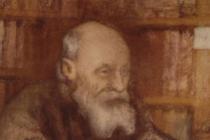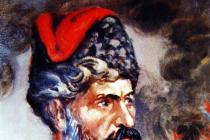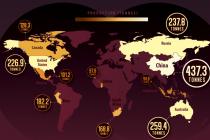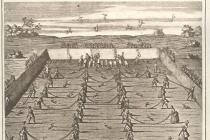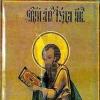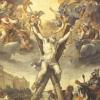Fyodor Ivanovich Girenok - about the most important things Photo: facebook.com/girenok There is an opinion that the term “Russian cosmism” was invented by the soil philosopher Fedor Ivanovich Girenok, who now holds the position of head of the department at the Faculty of Philosophy of Moscow State University. In the scientific world, Girenok is known as the author of shocking theories that man is not a rational, but a hallucinating creature, and we descended not from a smart monkey who picked up a digging stick, but from a monkey suffering from autism. And besides, shocking articles about the great homespun truth in the newspaper “Zavtra” and frantic criticism of modern science for the weakness of daring. In the unofficial ratings of philosophers, he is in the top ten together with Valery Podoroga, Oleg Genisaretsky, Pavel Tishchenko and other luminaries from the Institute of Philosophy of the Academy of Sciences.
Fyodor Ivanovich himself does not mind being called the godfather of Russian cosmism and at one time gave several interviews in which he directly stated: yes, this is my idea.
What's the main idea?
If we put aside the husks, Russian cosmism is the story of the dreams of several extravagant thinkers of the late 19th and early 20th centuries about what humanity would become when science and technology allowed it to overcome natural imperfections, escape beyond the boundaries of planet Earth and even, perhaps, resurrect the dead. In a sense, it is science fiction with a strong philosophical basis. It’s as if H.G. Wells suddenly decided to write detailed long-term forecasts instead of novels about the distant future, sometimes falling into vigorous metaphysical pathos.
When did Russian cosmism appear and why?
How did it all begin? Since science began to radically change people's lives. It is still changing it now, but no one expected this a hundred years ago.
It is difficult for us to imagine what was going on in the head of an illiterate man from, say, a dense Arkhangelsk village, and even an Old Believer, completely wild, when he found himself in one of the capital cities. The most powerful cultural shock, shock, horror. Or how did a petty official living in some patriarchal Kostroma, where there are bells, clothes and bast shoes everywhere, react to the news of the first successful flight? Also shock, also shock.
From this shock, many strange things emerged, including unclear expectations. “What awaits us?” - people asked. An era of fabulous prosperity or fiery hell?
As Ekaterina Melnikova, a researcher from the European University in St. Petersburg, writes in her Ph.D. thesis, several publishing houses of that time, aimed at peasants who had just learned to read, began to publish brochures about the imminent end of the world, which were eagerly bought up at fairs along with popular prints and all other folk art. The peasants, watching how poles were installed along the roads and wires were stretched, out of habit, waited for the second coming. And really, what good can you expect from electric lighting? Only angels of the apocalypse.
The groundless liberal intelligentsia, on the contrary, had the most rosy expectations. Each new improvement: the telephone, smallpox vaccinations, anesthesia, psychoanalysis, airships and the internal combustion engine whetted the appetite. If we can fly an airship from one city to another, then why can't we travel between planets? Before our eyes, the fairy tale becomes reality - forward, forward, forward.
Who was the main Russian cosmist?
 Painting: Pasternak, Leonid Osipovich Philosopher Nikolai Fedorov (1829–1903). Impressed by the successes of science, at some point he stated in plain text: why don’t we resurrect all our ancestors? And in fact, friends, since the engineer Popov, using his head and a slide rule, invented such a miracle as radio, shouldn’t we take aim at the resurrection of people?
Painting: Pasternak, Leonid Osipovich Philosopher Nikolai Fedorov (1829–1903). Impressed by the successes of science, at some point he stated in plain text: why don’t we resurrect all our ancestors? And in fact, friends, since the engineer Popov, using his head and a slide rule, invented such a miracle as radio, shouldn’t we take aim at the resurrection of people?
Then it seemed that a telegram from Syzran to Ryazan and a general resurrection according to the scientific method were tasks of a comparable level of complexity. We solved the first one, let's solve the second one. This progress now equals an updated version of a useless gadget. There is no trace of magic left. And in the times of the cosmists it flowed like a river.
Fedorov himself worked in Moscow at the Rumyantsev Museum and was a famous ascetic and unmercenary. In our time, we are accustomed to the fact that ascetics and unmercenaries, especially if they go to church, fervently despise science and, like the arch-peasant German Sterligov, from time to time propose that Russians burn sorcerers. Fedorov was different. Science and philosophy, he said, must act, must fight the forces of nature, infected with sin, until complete and final victory. That is, until the general resurrection, when technology will be able to bring our ancestors back to life right up to Adam.
This resurrection twist is very strange. The historian of Russian philosophy, Professor Zenkovsky, writes this way - Fedorov strayed into magic and science fiction. Why did he act like this? Before that, he composed things that were normal from the point of view of Russian philosophy: about repentance and forgiveness, for example. Apparently, the excitement and even the frenzy of new possibilities made the philosopher’s head spin too.
Who else was a cosmist?

Photo: wikipedia.org
Konstantin Tsiolkovsky (1857–1935) is another fascinating hero. A poor schoolteacher, with his wife and children, in provincial Kaluga, in his free time from work, is busy making models of airships capable of conquering distant planets together with his friend, a tax official. Isn't it strange - living in a primordial hut with stove heating, icons in the red corner and a kerosene lamp, drawing drawings of metal aircraft?

Photo: wikipedia.org
Alexander Chizhevsky (1897–1964) is a strange, very strange Soviet scientist who often visited Tsiolkovsky in Kaluga. He comes up with a chandelier that ionizes the air - it seems like a useful thing, and writes mind-blowing, on the verge of madness, hymns to the Sun, similar to the psalms of followers of some unknown Babylonian religion, with eerie pelevens in the background. He composes eugenic rules for humanity so that it quickly becomes radiant, in the sense of getting rid of monkey heredity and turning into pure light. There is information that towards the end of his life Chizhevsky openly worshiped the Sun.

Photo: wikipedia.org
Vladimir Vernadsky (1863–1945) is an incredible man from the same era. He came up with the noosphere, known to everyone from school. Where is she from? For what? Being a successful academic scientist, out of the blue he comes to the idea that the human mind is one of the cosmic elements, as powerful as gravity. And it, of course, forms its own separate sphere. Until recently, Tambov University had a faculty of noospheric security and law. People studied the issue closely. Now it seems the faculty has been closed.
What happened to Russian cosmism in the 20th century, and why is it remembered again now?
All Russian cosmism is an unprecedented optimism about the future, sometimes reaching extremes and even outright outrages, when reality and nonsense were mixed and churned.
And it exhausted itself when it became clear that scientific progress solves many problems, but does not solve everything, since it also has its limitations and its costs. Man-made disasters, environmental pollution, weapons of mass destruction - Fedorov did not think about such things. It is possible to create new models of supersonic aircraft, but the resurrection of the dead, alas, is beyond our control and is unlikely to happen.
Modern audiences pay little attention to the stars, and the most popular TV series is not about scientists conquering matter, but about Game of Thrones. And this is not because she is stupider than people who lived on the border of the nineteenth and twentieth centuries. It’s just that now no one has any illusions about how scientific knowledge arises and what it can achieve in the foreseeable future. And where there are no illusions, the demand for the fantastic constructions of cosmists is zero.
Cosmism would have disappeared long ago if not for the efforts of propagandists. They suddenly saw in him that very Russian idea - the meaning of the nation’s existence, the core and support, without which there is no life for the Russian people. Now this is such an alternative version of Orthodoxy, autocracy, nationality.
The authors who invented cosmism, for all their extravagance, were extremely far from issues of nationalism and state building. On the contrary, they wanted to quickly get to the promised land, where there are no nationalities, no borders, no customs points with sad men in ridiculous caps. They thought about planet Earth and about humanity; local sovereignties and territorial ambitions did not bother them. The name itself is curious - Russian cosmism. The prefix “Russian” here looks like a piece of the relics of Matrona of Moscow on the International Space Station. What does “Russian” have to do with it? We are talking about a planetary project in which all of humanity is involved. Humanity as a unit is impossible if it is divided along national lines. The noosphere is not only where Russians live or where crimson ringing is heard in the morning.
However, this always happens in this world: an idea that transcends borders, like Christianity two thousand years ago, in which there was neither a Greek nor a Jew, eventually finds itself guarding state borders. It’s the same story with cosmism: people dreamed of radiant humanity and landing on Alpha Centauri, but received a summons to the military registration and enlistment office.
See also: “Cosmists, guys, you are weak” - a conversation between investors of the Russian Planet publication and the editors.
UPD: An error crept into the first version of this article - the text about the philosopher Nikolai Fedorov was illustrated with a photograph of his namesake. The editors apologize.
Private educational institution
"Institute of Entrepreneurship"
In the discipline "Philosophy"
Topic: “Russian cosmism: main ideas and representatives”
Completed by a 1st year student
Faculty of Foreign Economic Activity and P gr. DO1PD
full-time education
specialty "Business"
administration"
Makatrova I.A.
Checked by the candidate
Philosophical Sciences, Associate Professor
Pashko Rima Gennadievna
Introduction
Basic ideas and trends in the philosophy of Russian cosmism
1.1. Russian cosmism of P.A. Florensky
1.2. Cosmism by V.S. Solovyov
1.3. Philosophy of N.F. Fedorov
1.4. Anthropocosmism of N.G. Kholodny
2. Modern civilization and Russian cosmism
List of used literature
Introduction
Russian cosmism is a philosophical movement and unites not only philosophers, but also scientists, religious thinkers, writers, poets, and artists.
The very origin of Russian cosmism was largely due to the unique social and cultural situation in Russia in the 19th century. The development of Russian cosmism owes much to the indispensable opposition of this philosophical trend to the very foundations of Western European science and culture. This confrontation contained the possibility of a productive dialogue that contributed to the change in Russian cosmism and its progressive impact on the culture of scientific research in the 20th century. The moral, social and philosophical meaning of Russian cosmism is of significant interest. It is capable of nourishing a very wide range of views - from extremely reactionary to liberal, which are concerned with the search for a creative reconciliation of the basic values of traditional society and the culture of a dynamic civilization.
Cosmism is often understood as a whole stream of Russian, and even world culture, which includes not only philosophers and scientists, but also writers, artists, and representatives of other creative professions. After all, the connection between man and the cosmos was the subject of study already by the first ancient Greek sages.
1. Main ideas and trendsI'm in the philosophy of Russian cosmism
1.1. Russian cosmism of P.A. Florensky
P.A. Florensky is one of those who rightfully belongs to the tradition of Russian cosmism.
He believed that there is an “ideal kinship” of the world and man, their permeation with each other,” interconnectedness. Like ancient Greek philosophy, he correlates the world and man as a macrocosm and a microcosm, which is in its own way an image and likeness of the Universe and carries within itself everything that is in the world.Despite the fact that the cosmic approach to man deprives him of the fullness of personal existence, Florensky managed to find a way out of this difficult situation.
Both the world and man are equally complex and internally infinite, so they can be considered as parts of each other. One can rightfully consider the world biologically the universal body of man, and economically the sphere of his management. The world is the revelation of Man, his projection. This is Florensky’s cosmic-anthropological dualism.
For Florensky, as well as for many Platonists, the picture of being is static: dynamic processes, evolution, history do not have a decisive significance. According to Florensky, the entire history of the world is darkness, just one “night, one terrible dream, stretching into centuries.”
1.2. Cosmism by V.S. Solovyov
The reality of the world around us is a true mystery and challenge for the mind. This task comes down to deducing the conditional from the unconditional, random reality from the absolute idea, the natural world of phenomena from the world of divine essence. The connecting link between the divine and natural world is man. Man combines within himself all kinds of opposites, which all boil down to one great opposition between the unconditional and the conditional, between the absolute and eternal essence and the transitory phenomenon or appearance. Man is both a deity and a nonentity. Consequently, it is necessary for a person to find a place and meaning in the overall connection of truly existing things.
Several ideas of Solovyov’s cosmism can be distinguished:
The idea of unity, the eternal, organically integral, truly existing world, which has a religious character (outside the divine principle, existence is chaos).
The secret of man's participation in the cosmos is in his divine nature (man is a mediator between God and material existence, a conductor of a unifying action on elemental multiplicity, man is the organizer and organizer of the universe.
The problem of completeness of knowledge generally cannot be presented as epistemological; complete knowledge is a religious-mystical worldview, thereby Solovyov criticizes rationality as an abstract principle, subordinating and transforming it in the light of religious experience and mystical contemplation.
1.3. Philosophy of N.F. Fedorov
Cosmos, the cosmic in philosophical consciousness were usually the embodiment of the boundless, absolute, inaccessible to limited human understanding, remaining the subject of meditation, high admiration, mixed with the awe of horror before the abyss of non-existence. A contemplative attitude towards space, dating back to ancient times, prevailed for many centuries. And only starting with Fedorov, philosophy and science included the demand for transformative activity on the part of humanity, aimed at the macrocosm. For a thinker, the fight against separating space is “the first step in the fight against all-consuming time.” Two global victories of humanity: - over space and time - are interconnected and interdependent. The field of transformed, immortal life can be not only the entire Universe, endless and inexhaustible in its energy and material capabilities, but also long-lived, and then immortal creatures with a biologically flexible, remade organism controlled by consciousness, who will be able to live and create in the most incredible extraterrestrial conditions. The essence of the idea of “regulation of nature” is not only in specific projects, many of which are already being implemented or can be implemented - it is more radical, setting the highest goal to transform the very status of natural and cosmic existence, the very nature of man.
Fedorov’s prophetic idea about the inextricable connection between space and man is confirmed in modern scientific approaches. In this regard, the anthropic principle can be cited as an example. It is as follows: the world would not be what it is if there were no observer in it, i.e. people (feeling and thinking beings). If the world were even a little different - and we would not exist: if the parameters of the components of the world had shifted, if some elementary particle had been different or disappeared - neither life nor consciousness would have appeared. Therefore, when we set the task of changing either the world or a person, it will be necessary to take this principle into account. You can change your (human) nature only along with changing the world in the same direction, and vice versa, when a person, without changing himself, without taking the path of his own spiritualization, begins to conquer or transform nature (or the world), he comes to an inevitable imbalance, to a crisis, environmental and moral. Such a one-sided intervention made by an imperfect but self-satisfied person in nature (instead of regulation, conscious and reasonable) leads to the depletion of nature, which, like a boomerang (in the form of a catastrophe), falls on the person himself.
1.4. Anthropocosmism of N.G. Kholodny
In his main work “Darwinist Thoughts about Nature and Man” (1944), N.G. Kholodny develops his philosophy of anthropocosmism and theory of knowledge based on the ideas of evolutionism. In contrast to anthropocentrism (which placed man at the center of the entire universe), Kholodny uses anthropocosmism, which emphasizes the enormous importance of human activity in the processes of evolution of nature, in the relationship between man and nature. In his book, Kholodny analyzes the relationship between man and nature, shows the process of man creating a unique environment, different from the natural one, which he calls the anthroposphere. The anthroposphere, being part of the biosphere, was created by man and his labor. “Man, despite the significant features of the living environment he has created, continues to remain an integral part of the cosmos, completely subordinate to the laws operating in it. Man is not above nature, but inside nature.” The main difference between the adaptability of the organism to the environment of humans and animals, according to Kholodny, is that the passive adaptation of the organism to changing environmental conditions, characteristic of animals, is replaced by the activity of humans seeking to change the environment in accordance with their goals. Labor remains the main condition for growth human mental abilities. For Kholodny, there is no doubt about the connection between human intellectual abilities and his cosmic environment, which is the result of evolution and natural selection. Kholodny defines science as knowledge that is ordered, brought into a system, organized and capable of further development. Despite the autonomy of science, it is closely connected with activity and production. Kholodny sees a pattern in the development of science in the fact that science obeys the general laws of organic and social evolution, i.e. In the development of science, a decisive role is played by internal factors (related to evolution) and, last of all, factors external to science (religion and philosophy). Kholodny associates the independence of evolutionary processes with the fact that each previous stage determines the next one, and extraneous factors can only accelerate or slow down the development process, but do not determine it. Anthropocosmism, according to Kholodny, entails a fundamental change in man’s relationship with nature. First of all, it leads to a person’s feeling of his organic, inextricable and effective connection with the entire cosmos. And space has an impact on a person, influences his life. Anthropocosmism presupposes a radical change in the place of man in space: man becomes (thanks to the successes of science and technology) a cosmic factor that transforms nature in the part of the Universe where he lives. Kholodny's evolutionary theory of cognition addresses the evolving adaptation of a person's psycho-physiological organization to the environment.
2. Modern civilization and Russian cosmism
The rapid development of technology led to natural crisis phenomena that transformed at the end of the 20th century. into global problems, including those related to the environment. The culture of technogenic civilization has always included scientific rationality, which was aimed at transforming the surrounding world in accordance with the needs of humanity. It is necessary to point out the coincidence of many ideas of the scientific picture of the world with the ideas of the philosophy of Russian cosmism. In Russian cosmism, an attempt was made to revive the idea of an organic connection between man and space.
The idea of the relationship between man and the cosmos was especially highlighted in the works of K.E. Tsiolkovsky, who even calls one of them “Cosmic Philosophy.” The entire cosmos determines our life, he wrote, everything is continuous and everything is one. The universe would have no meaning if it were not filled with an organic, intelligent, sentient world. Tsiolkovsky not only points out the relationship between man and the Cosmos, but also emphasizes man’s dependence on it.
This idea - the influence of both near and far space on human life - was considered in some detail by A.L. Chizhevsky, who believed that our scientific worldview is still far from the historical understanding of the significance of cosmic radiation for the organic kingdom. Nevertheless, a number of scientific achievements of the 20th century, according to Chizhevsky, allow us to conclude that “in the natural sciences, the idea of the unity and connectedness of all phenomena in the world and the sense of the world as an indivisible whole have reached particular clarity and depth in our days. The structure of the Earth, its physical chemistry, and biosphere are insights into the structure and mechanics of the Universe.” Chizhevsky contrasts his point of view with the existing opinion that life is the result of a random play of earthly forces only. For him, life is to a much greater extent a cosmic phenomenon than an earthly one. It was created by the influence of the creative dynamics of space on the inert material of the Earth. Man is not only an earthly being, he noted, but also a cosmic one, connected by all his biology, all the molecules, particles of his bodies with the cosmos, with its rays, flows and fields. In this case, the influence of solar energy on the course of life processes is not at all accidental. Chizhevsky was one of the first researchers to substantiate this idea with specific scientific facts. In particular, he analyzed the correlations between solar activity and epidemic peaks and showed that solar activity acts as a kind of regulator of the course of epidemic processes. This, of course, does not mean that the state of sun activity is the direct cause of the epidemic spread of certain diseases, but the activity of the Sun contributes to their rapid maturation and intensive course.
In Russian cosmism, not only the dependence of man on space, but also the reverse influence of man on the world around him was quite clearly understood. The proportionality of man and the rest of the world served as the basis for the idea developed by Russian cosmists about the need to measure human activity with the principles of the integrity of this world. Russian cosmism substantiated the principles of a new relationship between man and nature. In fact, he came quite close to understanding those problems that later became known as global ones. At the very least, the idea of a possible ecological crisis, although implicitly, still clearly sounded in the works of cosmists and was not at all accidental. The intuitive awareness of Russian cosmism of possible global contradictions between the technocratic activity of man and the harmony of the cosmos led him to search for a way out of a possible future unfavorable state into which humanity could be plunged.
Each of the cosmists proposed their own version of the future development of humanity. Tsiolkovsky painted a completely idyllic picture: the climate will change according to desire and need. The whole earth will become inhabitable and bear great fruits. There will be full scope for the development of both social and individual human properties. The technology of the future will make it possible to study all the planets; imperfect worlds will be eliminated and replaced by their own population. The earth will give its surplus of people to the sky colonies. Ultimately, we will see an infinite Universe with an infinite number of perfect beings. The most realistic scenarios were considered in Vernadsky's concept. Consideration of man as a special geological force capable of radically changing the world in which he lives led to the conclusion about the possible negative consequences of human activity, which can be assessed as a prediction of probable global environmental crises. At the same time, Vernadsky optimistically considered the prospects of humanity, linking its future with the processes of transition of the biosphere into the noosphere and the increasing regulatory role of the human Mind. Interesting reflections were offered in Fedorov's philosophy of the “common cause,” in which he warned against the possible consequences of unwise treatment of nature. “Man has apparently done all the evil he could in relation to nature (exhaustion, devastation, predation), and in relation to each other (the invention of destructive tools and, in general, means for mutual destruction).” All the troubles of our life, in his opinion, occur due to the disharmony of man and nature. The common cause acts as the control of the elemental forces of nature. Therefore, everything depends on the person.” Those. the common cause appeared as a path leading humanity to unity and renewal on a humanistic, moral basis.
Conclusion
In the philosophy of cosmism, two aspects of the relationship between man and the cosmos were very clearly identified: on the one hand, man was considered as an integral part of the changing Cosmos, dependent in all its manifestations on the cosmic whole. On the other hand, man himself was considered as a factor in evolution, developing his abilities in such a way that, by creating new equipment and technology, he began to actively influence the world around him. And although at the turn of the XIX-XX centuries. faith in scientific and technological progress was quite visible and the crisis consequences of the technocratic attitude towards the world had not yet manifested themselves, cosmists warned future generations from the possible negative consequences of the unrestrained and unlimited technological exploitation of nature. And yet, cosmism did not become widespread and repeated the fate of many philosophical movements, the productive ideas of which were significantly ahead of their era. Nevertheless, in the modern situation in the face of the environmental crisis, the search for a “common cause” as a regulation of relations between man and the rest of the world is already acquiring priority importance. It is especially worth emphasizing the coincidence of the main principles of the philosophy of cosmism and many of the basic ideas of the modern scientific picture of the world. Cosmism returns us to a holistic vision of the world as the unity of man and the cosmos. The current of Russian cosmism has a universal significance; it provides a deep theory, astonishing anticipations, looking not only into modern times, but also into much more distant times. Nowadays, preoccupied with the search for a fundamentally new type of thinking that could open the horizons of collective, planetary hope, the legacy of Russian cosmists acquires a special attractive force. Abstract >> Sociology
Sorokin. Russian cosmism N. Fedorov, V. Vernadsky and Chizhevsky. Basic topics in Russian sociology. ... 5. Russian ethical-subjective school. Main representatives given... contributed to education Russian nation. Basic ideas are summarized as follows...
Russian cosmism and its role in the development of domestic science
Abstract >> Philosophy... ideas Russian cosmism in science. Representatives Russian cosmism- Tsiolkovsky, Chizhevsky, Vernadsky and their work 2.2 Russian cosmism and pedagogical thought - Pedagogical ideas Russians...can be called Russians cosmism and from which main components it...
Russian philosophy (8)
Abstract >> PhilosophyCertain ideas and a categorical apparatus was formed. Three were formed here main flow of domestic... representatives Russian abroad is enduring, and their quest is deeply consonant with our days. Question No. 5. Philosophy Russian cosmism ...
Philosophy V.S. Solovyov and Russian cosmism
Lecture >> PhilosophyBulgakov is dominated by two main motive: recognition of deep... ideas cosmism developed not only by philosophers and natural scientists, but also representatives... etc.). One of the central ideas Russian cosmism is the thesis about cosmic destiny...
The future of humanity... This topic has always been considered with great interest within both the Eastern and European philosophical traditions. But in the second half of the 20th century, the emphasis shifted sharply: people began not only to dream of a wonderful future, but also to look for optimal ways to achieve it. And along this path, a logical question arose: “Is the future possible in principle?” The number of nuclear weapons on the planet and the likelihood of an environmental cataclysm do not allow us to give an affirmative answer. Understanding the difficulties in the relationship between nature and man, as well as relationships between people, has become of greatest relevance. Several traditions have emerged through the discussion of these issues. Cosmism in Russian philosophy is one of them. We will talk about it in this article.
Definition
The name “Russian cosmism” arose in the 60s, when people were wildly rejoicing over space exploration and turning to the almost forgotten legacy of K. E. Tsiolkovsky. Then it covered a wide area of Russian culture of the late 19th and early 20th centuries. Its most prominent representatives were: in poetry - Bryusov, Tyutchev; in music - Scriabin; in painting - Nesterov. And the philosophical direction was formed around the ideas of K. E. Tsiolkovsky (who was supported by such prominent scientists as V. I. Vernadsky and A. L. Chizhevsky) and the works of N. F. Fedorov.
First of all, cosmist philosophers reflected on the future prospects for the development of mankind. Of course, due to the lifestyle and thinking style of the authors, their works are very different. But, despite this, they can find many common ideas that complement and develop each other and form a whole direction in Russian philosophy.
main idea
Russian cosmism was the first to substantiate the idea of uniting all people, based not so much on political and ideological reasons, but on moral and environmental ones. Thus, the most important feature of the philosophical direction was formed - the combination of such previously incompatible problems as the establishment of universal brotherhood, space exploration and environmental conservation.
Directions of Russian cosmism
There are several of them, but there are only five main currents. We have already mentioned some of them above. Now we present you the complete list:
- Natural science (Tsiolkovsky, Vernadsky, Chizhevsky).
- Religious and philosophical (Fedorov).
- Artistic and poetic (Morozov, Sukhovo-Kobylin, Bryusov, Odoevsky, Tyutchev).
- Esoteric (Roerich).
- Noospheric (Shipov, Akimov, Dmitriev).
Below we will talk about representatives of the first two directions.

Founder of cosmism
The founder of cosmism and its largest representative is He never engaged in philosophy professionally. Fedorov earned his living first by teaching and then by working in the library. During Nikolai Fedorovich’s lifetime, very few of his works were published. But these publications were enough for many philosophers and writers to admire his ideas. Particularly favorable reviews came from A. M. Gorky, F. M. Dostoevsky and L. N. Tolstoy.
Many ideas of Russian cosmism were formulated by Fedorov in his work “Philosophy of the Common Cause.” He believed that the reason for the disharmony in the relationship between nature and man lies in the disorder of the latter’s life. And nature, due to its unconsciousness, acts as a hostile force. Only this force can be subdued with the help of the human mind. The philosopher believed that “people should bring harmony into the world and restore order in it.” Thanks to this, the evolution of nature will turn from spontaneous to consciously regulated.

General regulation
Russian philosophy, Russian cosmism would be unthinkable without Fedorov’s idea of implementing universal regulation. It is necessary to bridge the gap between nature and man. At the same time, psychophysiological regulation implies control of our inner strength. The external one unfolds from our planet to the Universe and covers several stages:
- Meteor regulation (object - Earth).
- Planetary astroregulation (object - Solar system).
- Cosmic (object - the Universe).
By passing these steps, humanity will be able to unite all existing star worlds. By the way, Russian cosmism as a philosophical movement arose precisely thanks to this idea. So Nikolai Fedorovich can be confidently called a genius.
Despite the utopian nature of many of Fedorov’s theories, modern cosmism (Russian) professes many ideas of his heritage: the projectivity of knowledge and synthetism, regulation of social life and natural processes, the close connection of morality and knowledge, perpetuation of human life, etc.

Tsiolkovsky's four principles
Konstantin Eduardovich Tsiolkovsky had a significant influence on cosmism in Russian philosophy. He is known as an original thinker, science fiction writer, and a pioneer of astronautics and rocket dynamics.
Konstantin Eduardovich believed that our world can only be explained from a cosmic point of view. The future of the world is people. All our activities should focus on improving the interaction between space and humans. Freeing intelligent organisms from dependence on their environment is one of the main tasks of evolution. Konstantin Eduardovich thought that space exploration could unite people into an integral state.
There are a number of philosophical principles on which Tsiolkovsky relied. Russian cosmism still professes them. There are four such principles. Let's look at them in order of importance:
- Panpsychism (recognition of the sensitivity of the Universe).
- Monism (matter is one, and its properties are the same).
- The principle of infinity (the power of the cosmic mind and the Universe are infinite).
- The principle of self-organization (the Universe itself builds its own structure).

Vernadsky's noosphere
Many ideas of Russian cosmism were formulated by Vladimir Ivanovich Vernadsky. He was not only an outstanding natural scientist, but also a significant thinker, as well as the founder of the doctrine of the biosphere and its transition to the noosphere.
V.I. Vernadsky and other representatives of such a movement as Russian cosmism believed that with the help of science, humanity would be able to subjugate the universe and become responsible for its fate. This can be explained by the fact that “scientific work will become a manifestation of geological work, and this will create a special state of the biosphere and prepare it for the transition to the noosphere.” The thinker understood the latter as the sphere of expansion of intelligent human activity aimed at maintaining life on the planet within the biosphere, then in the circumsolar space and, ultimately, beyond it. According to V.I. Vernadsky, evolution itself prepared the entry of humanity into the era of the noosphere. And the main condition for this transition is the unification of creative conditions to increase the general level of people’s well-being.

Solar activity of Chizhevsky
Russian philosophy and Russian cosmism received a significant impetus in development thanks to work that dealt with the influence on the history of mankind.
The scientist believed that revolutionary upheavals occurred during periods of greatest solar activity. This phenomenon repeats itself at intervals of 11 years. In turn, the eleven-year cycle consists of 4 periods:
- Minimal excitability (3 years).
- Increased excitability (2 years).
- Maximum increase in excitability (3 years).
- Decreased excitability (3 years).
Chizhevsky's theories about the influence on the behavior of specific people and social phenomena are still very widespread today.

Conclusion
So, we looked at Russian cosmism as a philosophical direction. It should be noted that it took man many hundreds of years to acquire a rational appearance along with a developed awareness of his own spirituality. Going through the stages of worldview formation, human civilization discovered new types of knowledge, creating new branches of philosophical views and sciences.

At the present stage, taking into account past experience, humanity has formed a clear structure for itself and identified the most useful priorities. But, as before, we did not receive answers to questions about the meaning of life and the picture of the universe on the planet. And since a person will always have a tendency to think, riddles will always arise, the answers to which will never be found.
test
1. Basic principles of Russian mystical cosmism
Russian cosmism philosophy
Russian cosmism is the doctrine of the inextricable unity of man and space, of the cosmic nature of man and his limitless possibilities for space exploration.
Among the origins of Russian cosmism, the following can be distinguished:
1. The philosophical basis of cosmism is the ideas of the development of the world, developed by philosophy throughout its entire historical development.
2. Religious ideas had a significant influence on the formation and development of the ideas of Russian cosmism. Many of its representatives were religious thinkers, for example, N.F. Fedorov, V.S. Solovyov, P.A. Florensky. The essence of religious influence was manifested primarily through the moral postulates of religion. The Christian idea that all people are brothers gives an idea about the unity of all things - earthly and heavenly. This postulate lies at the basis of Russian cosmism.
In addition, the religious influence on Russian cosmism is clearly visible through the Christian doctrine of the resurrection of people. This can be seen in the concept of “patrification of fathers” by N.F. Fedorov. And the attempt to realize it is connected with the idea of a single earthly and heavenly world.
3. Naturally - scientific - the support of Russian cosmism on the human mind, science, technology. The rapid development of science in the second half of the 19th century. and new discoveries in various branches of knowledge prompted cosmists to come up with brilliant hypotheses. Thus, the development of science allowed N.F. Fedorov to express hope and count on the future resurrection of the dead, not only with the help of divine grace, but thanks to scientific methods.
4. The historical roots of Russian cosmism are directly related to Russia and the national characteristics of the Russian people.
One of the main postulates of Russian cosmism is the idea of the unity of people, of all humanity. The idea of Russian conciliarity, unity, inherent in Russians, the traditional rural community is the historical foundation on which Russian cosmism arose and developed.
The ideas of Russian cosmism were developed by such thinkers as N.F. Fedorov, V.S. Solovyov, P.A. Florensky.
Nikolai Fedorovich Fedorov (1828 - 1903) is rightfully considered the father of Russian cosmism. This original thinker belongs to the galaxy of undeservedly forgotten scientists, whose work has only recently become again accessible to the domestic reader.
His original way of thinking and action, high morality, and desire to help those in need invariably attracted others to him. He was highly valued by his contemporaries, who were usually stingy with praise for L.N. Tolstoy spoke admiringly of Fedorov: “I am proud that I live at the same time as such a person,” V.S. Solovyov recognized Fedorov as “his teacher and spiritual father.”
Fedorov's entire philosophy centers around his main idea - victory over death, the resurrection of the dead. The highest meaning of existence for him is life itself, and the highest morality is activity in the name of life. He considered the greatest injustice to be the limitation of life to a certain time, the limit that death sets for it. According to Fedorov, the main goal of human activity should be the struggle for human immortality. Moreover, for immortality, not personal and not for a select few, but for the entire human race, including long-dead ancestors. He considered it the duty of descendants to return life to those generations on whose shoulders they stand. “You need to live not for yourself (egoism) and not for others (altruism), - said Fedorov, - but with everyone and for everyone; This is a union of the living (sons) for the resurrection of the dead (fathers).”
Fedorov tried to show humanity as a single race, which, by its nature, unites both contemporaries and past generations. And the “common cause” that can unite all people and eliminate non-brotherly relations is the struggle against death.
However, according to Fedorov, the unification of people is hampered by “blind nature”, which is hostile to them. Under the pressure of the forces of nature, a person is seized by the instinct of self-preservation. This leads to enmity between people, classes and nations. That is why Fedorov insisted on the need for conscious control of the evolution of nature. Humanity must set itself the task of remaking nature according to moral standards, establishing dominance over it, having conquered it, humanity will defeat death.
Despite the fact that Fedorov was a religious man, he believed that the resurrection would occur not through the intervention of God, but through the self-resurrection of man. According to Fedorov, man, having conquered death and become master of the cosmos, himself becomes God. And the resurrection itself is achieved with the help of science and technology, that is, man himself.
Fedorov thought globally; science should not only help resurrect the dead and give immortality to man, but also provide him with the necessary place for a normal existence. Fedorov solves this problem simply: it is necessary to resettle people to other planets to develop new “habitats.” And here is a new task for science - to help people master space. It was he who first stated that the Earth is not a border for man, “we must consider the Earth only as a starting point, and the whole universe as the field of our activity.” And to move into space, Fedorov proposed the need to master the electromagnetic energy of the globe, this would make it possible to regulate its movement in space and turn the Earth into a spaceship for flights into space. In the future, according to Fedorov’s plans, man will unite all the worlds and become a “planetary guide,” and this will manifest the unity of man and the cosmos.
Despite the unreality of many of Fedorov’s projects, his ideas are humanistic in nature. It is today that the theme of “brotherhood” of all people living on Earth sounds more than relevant in the face of an endless series of violence and wars.
Vladimir Solovyov (1853 - 1900). The topic of cosmism is most fully considered by V. Solovyov in the treatise “Readings on God-Humanity”. According to Solovyov, the true mystery for the mind is not the divine, but the clear and normal world. The reality of the world around us is a true mystery and challenge for the mind. "This task comes down to the derivation of the conditional from the unconditional, ... random reality from the absolute idea, the natural world of phenomena from the world of divine essence. The connecting link between the divine and natural world is man. Man combines all kinds of opposites, and is both a deity and insignificance" Solovyov V.S. Readings about God-manhood, Solovyov V.S. Works: In 2 vols., M., T. 2, 1989. Therefore, for a person it is necessary to find a place and meaning in the general connection of truly existing things. Solovyov sees dual unity in the divine being: “the active, or producing, unity of the divine creativity of the Word, and the produced, realized unity... - the unity of the organic body.” The eternity of God presupposes the eternity of humanity, but not of natural humanity, which arises on Earth at a certain period, but of intelligible, ideal man. This universal being contains all people. Therefore, man is a necessary and irreplaceable link in the absolute whole. This is what justifies the assumption of two great truths: human freedom and human immortality.
Exclusive self-affirmation or egoism, omnipotent in practical life, is the fundamental evil of our nature, and since selfishness is characteristic of everything in nature, evil is a common property of all nature. Nature is a reflection of the unified idea and the existence of the separate, divided, scattered, alien to this idea. Solovyov comes to the conclusion that the nature of evil is metaphysical, seeing evil in relation to the soul of the world (Sophia, “primitive humanity”) and God. Its mediating position between God and the natural world contains the possibility of gaining independence, the temptation to possess “everything” from oneself, and not from God, and thereby the unity of the universe is violated. Ideal unity is possible only when the connection of the divine principle with the soul of the world occurs, where the first is the formative element, and the second is a passive force that perceives the ideal and supplies it with matter for development, a shell for its complete discovery. This connection is not of the nature of a one-time creation. The path to achieving a perfect and eternal organism is slow and painful. It can be explained by only one thing, without which neither God nor nature are conceivable - freedom. “If everything that exists (in nature or the world soul) must unite with the Divine - and this is the goal of all existence - then this unity, in order to be valid, must be mutual, i.e. come not only from God, but also from nature , be her own business."
The world cosmogonic process goes through many successive phases. Beginning with the stellar (astral) era, when matter is pulled together by cosmic bodies through the action of universal gravity, it ends with the creation of organic life and its perfection - the form of the human body. “In man, the world soul for the first time unites with the divine Logos in consciousness as a pure form of unity... In man, nature outgrows itself and passes into the realm of absolute existence. Perceiving and carrying in its consciousness the eternal divine idea and at the same time, by actual origin and existence inextricably linked with the nature of the external world, man is a natural mediator between God and material existence." Apart from man, all other beings are devoid of the divine principle and participate in it only by obeying natural external law. Like the world soul, a person who participates in the unity of God is free to have it as God. To do this, he “affirms himself separately from God, outside of God, falls away or is separated from God in his consciousness, just as the world soul initially separated from Him in its entire existence.” Thus, a new phase begins, not of cosmogonic, but of theological development, during which man goes through the path from an astral religion to a phallic one, in which he returns to his own material beginning.
We can highlight several indisputable ideas of Solovyov’s cosmism:
1. The idea of unity, the eternal, organically integral, truly existing world, which has a religious character (outside the divine principle, existence is chaos).
2. The mystery of man's involvement in the cosmos in his (man's) divine nature (man is a mediator between God and material existence).
3. In Solovyov’s cosmos, moral and religious meanings (expediency) dominate, which determine the essence of all phases and key moments of his evolution and existence.
4. The problem of completeness of knowledge cannot be presented as epistemological (complete knowledge is a religious-mystical worldview), thereby Solovyov criticizes rationality as an abstract principle, subordinating and transforming it in the light of religious experience and mystical contemplation.
Pavel Aleksandrovich Florensky (1882 - 1937) is one of those who rightfully belongs to the tradition of “Russian cosmism”. He believed that there is an “ideal kinship” between the world and man and their interconnectedness. Like ancient Greek philosophy, he relates the world and man as a macrocosm and a microcosm, which is in its own way the “image and likeness of the Universe” and carries within itself everything that is in the world. Despite the fact that the cosmic approach to man deprives him of the fullness of personal existence, Florensky managed to find a way out of this difficult situation. Both the world and man are equally complex and internally infinite, so they can be considered as parts of each other. One can rightfully consider the world biologically the universal body of man, and economically the sphere of his management. “The world is the revelation of Man, his projection” Florensky P.A. Macrocosmos and microcosmos, “Man and Nature”, 1989, No. 9.. This is the cosmic-anthropological dualism (or two-unity) of Florensky, who considers it within the framework of the traditional Platonic dualism of the above and below (our world is opposed to another, “premium”, which symbolically reveals itself in the realities of earthly existence). Such dualism, according to Florensky, can only be overcome in the Church: “In it, reality is spiritualized, sanctified, deified” Florensky P.A. From the theological heritage, "Theological Works", M., 1977, Issue 17.. "Deification" is the final result of the salvation of the whole world through the salvation of man, which occurs in the Church by the forces of Christ and His Spirit. Salvation eliminates the conflict between man and the world; this is the “cosmic side of Christianity” Florensky P.A. Pillar and Statement of Truth, M., Put, 1914. Florensky’s picture of existence is static: dynamic processes, evolution, history have no decisive significance. According to Florensky, the entire history of the world is darkness, just one “night, one terrible dream, stretching into centuries.”
ON THE. Berdyaev "The Meaning of History"
The work “The Meaning of History” was written in 1923. As the author himself, and later critics, believed, this book became Berdyaev’s most important legacy. In it, he examined the history of mankind by era. Berdyaev was a religious philosopher...
Some questions of philosophy
The problem of rationality is, for many reasons, one of the central problems in modern philosophy. It can be shown that almost all discussions taking place today in various fields of philosophical knowledge...
The main currents of philosophical thought in Russia in the 19th and 20th centuries
Cosmism is a specific worldview of cosmocentric orientation, a movement in philosophical and natural science thought. In Russia, since the middle of the last century, a unique cosmic direction of scientific worldview has been maturing...
Postmodernism. Modern religious philosophy
The concept of “postmodernism” (or “postmodern”) refers to the situation in the cultural identity of Western countries that developed at the end of the 20th century. Literally, this term means “post-modernity.” However, you need to keep in mind...
Socrates (c.469-399 BC) - ancient Greek philosopher, one of the founders of dialectics as a method of finding truth by asking leading questions - the so-called Socratic method...
The subject of philosophy and its formation
Russian cosmism is interesting because in the works of a number of philosophers and scientific thinkers (N.F. Fedorov, V.S. Solovyov, N.A. Uglov, K.E. Tsiolkovsky, V.I. Vernadsky, P.A. Florensky, N.G. Kholodny, A.L...
Russian cosmism
In addition to the above-mentioned philosophers, the concept of cosmism was also developed by such outstanding natural scientists as K.E. Tsiolkovsky, V.I. Vernadsky, A.L. Chizhevsky. Konstantin Eduardovich Tsiolkovsky (1857 - 1935)...
Russian cosmism
Russian cosmism is a philosophical and cultural movement that considers space, man and society as a co-evolutionary system. Being an integral sociocultural phenomenon, cosmism is focused on a synthetic vision of reality...
The beginning of Russian cosmism as, in the words of O. Shubaro, “a special spiritual-theoretical phenomenon”, “an integral socio-cultural phenomenon” is rightfully associated with the works of N. Fedorov. Nikolai Fedorovich Fedorov (1829-1903)...
Russian cosmism and its role in the development of Russian science
Konstantin Eduamrdovich Tsiolkomvsky (September 5 (17), 1857, Izhevskoye, Ryazan province, - September 19, 1935, Kaluga) - Russian and Soviet self-taught scientist, researcher, school teacher. The founder of modern astronautics...
System of philosophical views of D. Locke, D. Berkeley, D. Hume
Hume remade the teachings of Berkeley and Locke in an agnostic manner, smoothing out rough edges and eliminating extreme positions. Hume sought to create a philosophy of “common sense”, a cautious, “restrained” philosophy, alien to materialism...
Similarities and differences in the understanding of knowledge of the philosophy of Kant and the French materialists of the 18th century
Immanuel Kant (Kant, Immanuel) (1724-1804), representative of German classical philosophy of the Enlightenment. He had a significant influence on such thinkers as Fichte, Hegel, Schopenhauer and, to one degree or another, on all subsequent philosophical thought...
Philosophy of ancient India
Buddhism Buddhism is a religious and philosophical teaching (dharma) about spiritual awakening (bodhi), which arose in southern Asia. Buddhism is based on the doctrine of the “Four Noble Truths”: about suffering, about the origin and causes of suffering...
Philosophy of Russian cosmism
Philosophy has always been not indifferent to science. Attempts to isolate them once and for all from each other today must be considered futile; Moreover, the philosophy of science occupies a full place in the circle of philosophical fields of knowledge...
Stages of development of natural philosophical teaching
Positivism (French positivisme, from Latin positivus - positive) is a philosophical doctrine and direction in the methodology of science, which determines the only source of true...
Russian cosmism is a special spiritual and theoretical phenomenon that arose in Russia at the end of the 19th - beginning of the 20th centuries. Being an integral sociocultural phenomenon, cosmism is focused on a synthetic vision of reality, the perception of man as an organic part of cosmic unity, capable of realizing his active nature in creatively changing the universe 51 .
There are several directions in Russian cosmism:
Natural scientific cosmism (K.E. Tsiolkovsky, A.L. Chizhevsky, V.I. Vernadsky, A.A. Bogdanov, etc.).
Religious and philosophical cosmism (A.N. Bulgakov, V.S. Solovyov, P.A. Florensky, N.A. Berdyaev, N.F. Fedorov, etc.).
Artistic and poetic cosmism (V.F. Odoevsky, A.V. Sukhovo-Kobylin, N.A. Morozov, etc.).
Esoteric cosmism (N.K. and E.N. Roerich and others).
Noospheric cosmism (A.N. Dmitriev, A.G. Shipov, A.E. Akimov, N.N. Moiseev, A.P. Kaznacheev, A.D. Ursul, A.D. Moskovchenko, etc.).
Fedorov Nikolay Fedorovich(1829-1903) was a special, amazing, unique person and thinker. S.G. Semenova considers him the founder of active evolutionary cosmism.
The influence of N.F.’s ideas Fedorov's influence on his contemporaries was enormous. Vladimir Ilyin claims that in the person of Fedorov “for the second time humanity saw Socrates, i.e. a person behind whom creaturely possibilities already end and God-createdness begins.” K.E. called Fedorov “an amazing philosopher.” Tsiolkovsky in his memoirs. He described him as his first teacher at the Moscow “universities of self-education”, who instilled in him cosmic dreams. A well-known connection with Fedorov’s ideas can be found in A.N. Bely, V.Ya. Bryusova, N.A. Zabolotsky, V.V. Mayakovsky, A.P. Platonova, M.M. Prishvina, I.L. Selvinsky, O.D. Forsh, V.N. Khlebnikov, artist B.N. Chekrygina. A.M. Gorky was especially impressed by the activism in Fedorov’s views. Interest in Fedorov's teaching is also manifested outside of Russia - in England, France, Poland, the USA, Japan, etc.
The main work of N.F. Fedorova was "Philosophy of General affairs". Three ideas can be traced in this work: 1) the doctrine of the Trinity as the moral unification of humanity; 2) the doctrine of general resurrection; 3) the idea of active evolution of humanity.
The “philosophy of the common cause” opened up unprecedented distances for humanity and called for titanic transformative daring. “Everyone should be a knower and everyone should be an object of knowledge,” Fedorov believed. Through universal knowledge and labor, humanity is called upon to master the spontaneous, blind forces in nature and within itself, to go out into space for its active exploration and transformation, to acquire a new, immortal cosmic status of being, and in the full complement of previously living generations (“immanent resurrection”). Conscious control of evolution, the highest ideal of spiritualizing the world, is revealed by Fedorov in a sequential chain of tasks: this is the regulation of “meteoric”, cosmic phenomena; transformation of the spontaneously destructive course of natural forces into a consciously directed one; the creation of a new type of organization of society - “psychocracy” based on filial, kindred consciousness; work on overcoming death, transforming the physical nature of man; the endless creativity of immortal life in the universe. To fulfill this grandiose goal, the Russian thinker calls for universal knowledge, experience and work within the real world, real means and possibilities, and these limits will expand endlessly.
The development of the idea of “active evolution” became the most philosophically deep and original aspect of Fedorov’s teaching. Here are ideas about the new type organic progress: it is carried out - as opposed to progress purely technical, instrumental, “prosthetic” - in human nature itself (psychophysiological regulation). This includes the acquisition of a method of nutrition similar to plants that are able to synthesize the necessary organic compounds and build their tissues from elementary substances of the environment and sunlight (autotrophy of humanity, according to V.I. Vernadsky); this is the idea of “self-creation”, “natural tissue creation”, the future “full organ” of a person, giving him the possibility of endless movement, “consistent omnipresence”; This is also meteoric, cosmic regulation.
General regulation, Fedorov believed, is a process that has internal and external aspects. Internal, or psychophysiological, regulation involves controlling the blind force within ourselves. External regulation unfolds from a single Earth to an integral world and covers the following steps, ascending in scale and complexity:
Meteorological regulation, the object of which is the Earth as a whole.
Planetary astroregulation, the object of which is the Solar system.
Universal cosmic regulation, the object of which is the infinite Universe.
Meteor regulation includes:
a) control of atmospheric processes (overcoming meteorological “pogroms” - droughts, floods, hail, etc.); mastering the climate, identifying the optimal relationship between soil, forest and water, increasing their natural productivity;
b) regulation of seismic-volcanic phenomena;
c) telluric regulation (rational use of the earth's interior, replacement in the future of metal mined in mines with metal of meteoric and other cosmic origin);
d) helioregulation (use of solar energy and its displacement of labor-intensive coal mining, etc.).
The next stage of regulation of nature involves turning the Earth into a spaceship (“terrestrial rover” in Fedorov’s terminology). The Earth leaves its earthly orbit and goes into outer space along an independently plotted course. But by this time, all the peoples of the planet are one humanity, brotherhood and bear the full measure of responsibility for it. The entire Universe will turn into a Temple, “the most sacred place of the Temple will be the earth<...>the heavenly iconography of this heavenly Temple will be ray images fathers, an image of the external and internal structure of their bodies" 52. Further, humanity, together with the resurrected fathers, populates the entire Universe.
And one more important point in Fedorov’s teaching. He understood the biblical prediction of the apocalypse as a conditional educational task. After all creator can't be destroyer"he doesn't want to die not a single one, but wants everyone to be saved and come to the understanding of truth.” The thinker emphasizes: “Whether the end of the world will be a catastrophe or a peaceful transition without wars, without natural disasters - it depends on whether people remain opponents of the will of God, whether they remain in a state of eternal enmity, or, united, they will become instruments of the will of God in action.” turning destructive force into creative force" 53.
Almost a hundred years have passed since the death of N.F. Fedorov. One can evaluate his philosophical heritage in different ways. We can say in the words of S.N. Bulgakov: “the “project” itself should be understood not in letter, but in spirit, not naturalistically, but religiously-symbolically.” 54 But from the standpoint of today it is clear that the “Philosophy of the Common Cause” proclaims universal, planetary tasks of precisely the era of noospheric choice. Fedorov was soberly aware of the catastrophic direction that the development of the current civilization, “exploiting rather than restoring” nature, had taken.
Fedorov’s statement is of primary importance for modern humanity. the question of the moral transformation of humanity(“internal regulation”). Without this work on oneself, internal self-improvement, it is impossible to reach the stage of God-manhood, it is impossible to control even the Earth, let alone the entire Universe. The primacy of moral and ethical issues is characteristic of all Russian philosophy, and cosmist philosophers conveyed the importance of these issues through their projects.
Tsiolkovsky Konstantin Eduardovich(1857-1935) in our country is known to everyone as the father of astronautics. But he was also a thinker who developed his “cosmic philosophy.” Many of his philosophical brochures were published in Kaluga in the 20-30s. The subject of the scientist's research is the cosmic evolution of humanity on the scale of the entire universe.
In the cosmic philosophy of K.E. Tsiolkovsky we will find a motley mixture of various kinds of influences - from Hindu-Buddhist beliefs in reincarnation and ancient hylozoism to the morality of “reasonable egoism” and contemporary theosophy. Tsiolkovsky’s brilliant naivety not only connects them eclectically, but transforms them into the field of his own original worldview intuitions.
One can highlight a number of basic provisions of his cosmic philosophy.
Idea monism of the universe:“Everything is continuous and everything is one. Matter is one...” The Universe is a single, infinitely complex organism that has its own “cause” and “will”.
Idea panpsychism, those. the idea that the material universe is a living, spiritual entity. The elements that make it up are responsive and sensitive. But the degree of sensitivity varies from zero to an indefinitely large value depending on the development of the object. According to the scientist’s views, all bodies of the universe have the same essence, one beginning, which he calls the “spirit of matter,” the indivisible basis of the essence of the world. This is the philosophy of K.E. Tsiolkovsky is similar to the philosophy of Plato. Since the universe is spiritualized, it lives according to the laws of both the physical and mental worlds. Consequently, the main question of philosophy is solved by K.E. Tsiolkovsky from the standpoint unity of spiritual and material.
Idea "reasonable forces", operating in the universe, and the concept "will of the universe". A number of works by K.E. are devoted to these issues. Tsiolkovsky: “ Cosmic Philosophy", "The Will of the Universe", "Unknown Intelligent Forces", "First Cause", "Cause of Space" etc. The Universe, according to the views of the scientist, is not only material and spiritual, but has "reasonable will". Everything in the universe is subject to this “intelligent will.” In the universe, space civilizations play a huge, in a certain sense even a decisive role; our humanity is only one of them.
Idea spontaneous generation universe, according to which everything that exists in the universe is generated by the universe itself. But on the other hand, the universe itself exists due to the will of the first cause. The principle of spontaneous generation of life (autogony) exists, according to Tsiolkovsky, only on some planets, such as the Earth, but for most planets in the universe, life is organized by transferring higher forms from developed planets.
The universe is infinite in space and time. It includes an endless hierarchy of cosmic structures - from atoms (“spirit atoms”) to “ethereal islands”, i.e., in modern language, metagalaxies of different levels of complexity.
Idea infinity and eternity of life in the Universe. It is distributed by K.E. Tsiolkovsky on the world as a whole, on the rhythms of cosmic evolution, the endless hierarchy of cosmic structures. From the idea of eternity and immortality of the universe in K.E. Tsiolkovsky organically follows the idea of human immortality.
The anthropological theme is one of the central ones in Tsiolkovsky’s cosmic philosophy. Man occupies an intermediate position in the chain of cosmic evolution: the cosmos is inhabited by “mature beings” who are superior in their level of development to humans, and those who are lower in their development than humans. Presenting the universe as a social organism, Tsiolkovsky assigns an important role in its evolution to man, who must bring “reason and will” into it.
going into space is a necessary stage in the development of our civilization;
the process of space expansion, exploration and transformation of humanity’s increasingly expanding “ecological niche” in space and time will continue indefinitely;
adapting to the diverse conditions of space, a person will change not only socially and morally, but also biologically;
the process of transforming space will take place together with other space civilizations, into whose family our humanity will join. “Humanity will not remain forever on Earth, but in pursuit of light and space, it will first timidly penetrate beyond the atmosphere, and then conquer the entire circumsolar space,” Tsiolkovsky believes. Going into space is, according to his views, the law of human development and its moral duty.
In Tsiolkovsky’s thoughts, the idea deserves attention causation, operating in the universe: “In the end, everything that does not happen has its source in times long past<...>, our will, our actions - present and future - are the result of times long past."
An important feature of the scientist’s cosmic philosophy is the idea about the inevitability of humanity's cosmic future, which will reach the level of perfect life, will live in harmony with the cosmos and will spread this perfect organization of life throughout the universe. According to the views of K.E. Tsiolkovsky for the future:
What forecasts do we find in the cosmic philosophy of K.E. Tsiolkovsky regarding the more distant prospects of astronautics? After the implementation of global transformations of the solar system, our civilization will spread throughout the universe as a carrier of reason and happiness. This, Tsiolkovsky believed, is the greatest mission of humanity, the highest goal of its existence. Tsiolkovsky admitted the possibility of significantly extending human life. At a certain stage of space exploration, our civilization will come into contact with other space civilizations. The entire set of cosmic civilizations, including our own, acts as a single factor in the evolution of the cosmos, a single force that changes it with its transformative activities.
Many ideas of the cosmic philosophy of K.E. Tsiolkovsky have already turned out to be literally prophetic. It is possible that some controversial conclusions of the scientist will reveal new heuristic meanings in the renewed flow of human culture.
Chizhevsky Alexander Leonidovich(1897-1964) - an outstanding scientist, founder of helio- and cosmobiology, the theory and practice of aeroionification, thinker, poet, artist.
One of the fundamental ideas that determined the scientific research of A.L. Chizhevsky, is the idea of the unity of living and nonliving, man and space. In his opinion, everything on Earth is due to cosmic energy: changes in the weather and seasons, ebbs and flows, natural disasters and the peaceful development of plants, animals and humans. The entire evolution of the Earth and life on it occurs as a result of the process of vibration of cosmic forces.
A.L.'s point of view Chizhevsky’s idea of the origin of life on Earth is close to the ideas of other Russian cosmists, primarily K.E. Tsiolkovsky, V.I. Vernadsky, he also considers life a “cosmic phenomenon.” The scientist writes: “We have the right to consider the entire organic world of our planet as creativity, as a reflection of the cosmic process...” 55.
Cosmic energy, being a creative principle, sets a certain rhythm to all creation. Cosmic rhythm is, according to Chizhevsky, a world principle. Everything in the universe is subordinated to this principle. According to Chizhevsky, star systems are born, live and die in the same way as humans, animals and plants, but only in order to again create a new system or a new world. Establishing the fact of the eternal circulation, and therefore the immortality of the Cosmos as a “Great Whole,” Chizhevsky leads us to the realization of the eternal circulation, and therefore the immortality of life.
The main object of Chizhevsky’s research was the Sun, the influence of solar energy on the Earth’s biosphere, on humans. This is where he was born doctrine of heliotaraxy. A.L. Chizhevsky carefully studies the history of the occurrence of sunspots, their influence on living organisms, humans, and comes to the conclusion that the activity of the Sun is a natural phenomenon, it occurs periodically and is caused by internal and external reasons. A.L. Chizhevsky calculated the periodicity of spot-forming processes to be 11.1 years. Reflecting on the role the radiant energy of the Sun plays for planet Earth and its inhabitants, A.L. Chizhevsky comes to the following empirical conclusions:
The radiant energy of the Sun is one of the main factors that caused the development of organic life on Earth. The infinitely diverse manifestations of life on Earth are in direct energetic dependence on the Sun. The radiant energy of the Sun illuminates these formations with movement, feeling, and thought.
The radiant energy of the Sun is a powerful biological agent, and fluctuations in its quantity determine all those changes in organic nature that we observe in connection with the latitude of the place, time of year and other geophysical and seasonal factors.
The solar system is similar in its functions to a living organism; there is a connection between the physiological mechanisms of a living being and the physicochemical mechanisms of the Sun. To live means to pass through the body a flow of energy that originates from the Sun. The amount of incoming radiant energy affects the acceleration of chemical and physiological reactions.
Chizhevsky comes to the conclusion that, similar to the 11-year periodicity of sun activity, there is an 11-year periodicity of various phenomena in the physical world: natural disasters, plant growth, various manifestations in the life of animals, in physical phenomena. In human life, this is the periodicity of various diseases, crime, social and political manifestations, economic development, etc. Thus, man and environment in the teachings of A.L. Chizhevsky are connected with each other by a deep connection.
An important aspect of A.L.’s cosmism Chizhevsky is a position on the influence of solar activity on the historical process. Based on empirical data, he identified a special branch of knowledge - historiometry. This new science is based on energy hypothesis about the connection between solar activity and the world-historical process. The scientist proves that both the maximums and minimums of the radiant energy of the Sun have almost the same effect on a person: they inhibit his mental activity and produce a number of negative physiological effects. Only the optimum of the radiant energy of the Sun produces a beneficial effect on humans. Chizhevsky proved the coincidence in time of cyclical manifestations of solar activity and mass manifestations in human society. Certain types of aggressive behavior (psychosis, murder, rape, fights, robbery, etc.), wars, revolutions, uprisings, reforms, etc. Taken together, they form a picture of mass action. Strong perturbations of the Sun, i.e. Magnetic storms caused by the appearance of sunspots, in all studied cases, simultaneously caused a decrease in intellectual activity in most people with increased nervous and sexual excitability, pronounced emotionality and an excess of motor energy.
Chizhevsky divided the world-historical cycle, coinciding with the sun cycle, equal to 11.1 years, into four periods: 1) the era of minimum, equal to three years; 2) the epoch of maximum growth equal to two years; 3) maximum epoch equal to three years; 4) the epoch of the falling maximum, equal to three years. The beginning and end of the world-historical cycle are taken to be the dates of two successive minima of solar activity. The scientist characterizes each of the periods. A characteristic feature of the period of minimal activity is the fragmentation of the popular masses, their indifference to political and military issues, a peaceful mood, compliance, and tolerance. At this time, diplomatic relations are being established in the international arena, and reforms are being carried out within states. The beginning of the period of increasing activity is characterized by a significantly greater increase in mass activity. The power of suggestion manifests itself among the masses, parties begin to organize, programs are determined, leaders are identified. This era determines the basis for the further development of historical events throughout this cycle. The third period is the main one, resolving important historical problems. He encourages humanity to the greatest follies and the greatest good deeds. The fourth stage is a period of decline in people's activity. It can also be replete with major events, but they, as a rule, are in the process of completion.
Thus, Chizhevsky believes that mass human activity is structured according to the type of correct alternation of tension and relaxation, work and rest, exaltation and depression. This alternation consists of a functional dependence on the degree of tension in the activity of the Sun. At the same time, Chizhevsky emphasizes that the reasons for mass human manifestations lie in the socio-economic and political life of people, and solar activity is only a factor that increases or decreases them.
Vernadsky Vladimir Ivanovich(1863-1945) is rightly called the Lomonosov of the twentieth century. A rare synthesizing ability and comprehensiveness distinguish his creative genius. The scientist founded and developed several new scientific disciplines, became the creator of the doctrine of the biosphere and its transition to a new quality - the noosphere. An academician of the St. Petersburg Academy of Sciences, and then the USSR Academy of Sciences, a member of numerous foreign academies, Vernadsky was also a major public figure, an outstanding organizer of science in our country.
In the works of V.I. Vernadsky can detect a number of philosophical ideas: 1) the idea of the geological and cosmic eternity of life; 2) the idea of the geological and cosmic role of man and humanity; 3) the idea of the growing role of science and the human mind in building the shell of the Earth - the noosphere 56.
Arguing about the connection between life and world evolution, the scientist concludes that “life is not random a phenomenon in world evolution, but closely related to it consequence» 57. Life is a “buffer” between space and “inert” non-living matter, a “buffer” capable of using cosmic energy to transform planetary matter. According to N.N. Moiseev, in Vernadsky, “life becomes a catalyst for the development process” 58.
IN AND. Vernadsky believed that there are three realities in the world: space, microworld, biosphere. In his works on the biosphere, Vernadsky for the first time introduces the term “living matter,” which he considers the basis of the biosphere, as well as the concept of “cosmic environment of the world,” which is limitless. Just like A.L. Chizhevsky, the scientist believed that even distant star clusters influence the Earth. He believed that thanks to cosmic radiation the biosphere acquires new properties. Thanks to these radiations, the “matter of the biosphere” is imbued with energy, it “becomes active,” collects and distributes the energy received in the form of radiation in the biosphere and converts it into energy that is capable of producing work.
The creation of biogeochemistry and the doctrine of the biosphere by V.I. Vernadsky raised a new question - about the place of man in planetary development. The work of cultural humanity, which is closely related to consciousness, is emerging as a new geological and geochemical force. This is a natural process, it is determined by the entire course of geological history and is not subject to human will. Vernadsky emphasizes that man created the world of technical devices - technosphere, which the scientist regards as another artificial global sphere of the planet. The roots of V.I.’s ideas about the technosphere Vernadsky found it in the works of A. Humboldt and K. Ritter.
Vernadsky considers the emergence of man on our planet as a fact of the greatest importance, unique in the course of geological history. The scientist concludes: “It is obvious that there is a certain direction in the paleontological evolution of organized living beings and that the appearance in the biosphere of reason, consciousness, directing will - these basic manifestations of man - cannot be accidental” 59.
In the work “Autotrophy of Humanity” V.I. Vernadsky comes to the conclusion that matter has always existed and is cosmically eternal, life has always existed in the universe and is also cosmically eternal, life is spreading in the universe, there is a purposeful evolution in the universe of “living matter”, human mind and will are an organic part of “living matter”, as well as great geological force; That's why life is a cosmic phenomenon.
IN AND. Vernadsky believes that “Homo sapiens is not the completion of creation,” but serves as an intermediate link in the long chain of evolution of creatures; he needs to further develop his thinking apparatus. According to the scientist, over time, a person will change the form of nutrition and energy sources, then he will move to a higher evolutionary level. As soon as a person discovers the direct synthesis of food without the mediation of organized beings, he will be freed from dependence on other beings. From a socially heterotrophic creature (using living organisms for its nutrition), he will become a socially autotrophic(i.e., synthesizing from inorganic substances - water, carbon dioxide, inorganic nitrogen compounds all the food substances necessary for life, using the energy of photosynthesis, like all green plants, or chemosynthesis, like some chemotrophic bacteria). Due to this fact, it would appear on the earth's crust for the first time in the geological history of the globe. « autotrophic animal- autotrophic vertebrate" 60.
Cosmists such as N.F. spoke about changing the nature of man and his transition to other sources of nutrition. Fedorov, K.E. Tsiolkovsky. They predicted the evolutionary transformation of people into “radiant humanity.” Russian religious cosmists spoke about the evolution of humanity to “divine humanity.” Human autotrophy is a real way to overcome death, which cosmists N.F. dreamed of. Fedorov, N.A. Setnitsky, A.K. Gorsky, A.K. Maneev and others. V.I. himself. Vernadsky believed that the creation of a new autotrophic being gives him “hitherto missing opportunities to use his age-old spiritual aspirations; it will really open up the path to a better life for him.”
IN AND. Vernadsky is the author of the idea of the noosphere, which is widely discussed at present. The noosphere is the sphere of the mind. Vernadsky borrowed the term “noosphere” from Teilhard de Chardin, who believed that the noosphere is the shell of the Earth created by human thought. Vernadsky interprets the idea of the noosphere in his own way, believing that the noosphere is a shell around the Earth created by human cultural energy. The noosphere arose with the advent of the human species Homo sapiens and until now has developed spontaneously. The task of humanity is to move on to the conscious construction of the noosphere. According to the scientist, all the necessary circumstances have arisen for this: first of all, scientific thought has a planetary scope, it acts as a new geological force that increases the influence of living matter on the evolution of the biosphere. Science reveals its planetary character. From the irreversibility of the evolutionary process follows the irreversibility of the evolutionary development of the noosphere.
Thus, the philosophical teachings of Russian cosmism serve as a source of new ideas and trends in modern natural science and philosophy, which find their implementation in practical developments. An important condition for becoming familiar with the heritage of Russian cosmists is a critical understanding of their ideas and projects from the perspective of modern science, the separation of the scientific and fantastic sides of their work.

